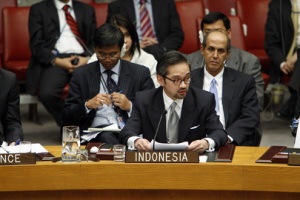By Daryl G. Kimball
Today, the Indonesian parliament approved the ratification of the 1996 Comprehensive Test Ban Treaty, bringing the number ratifications necessary for entry into force down from 9 to 8.
 Indonesian Foreign Minister Marty Natalegawa
Indonesian Foreign Minister Marty Natalegawa
We hope to "create new momentum so that the other countries in a similar position to Indonesia can also follow suit in beginning their ratification process," Indonesia's Foreign Minister Marty Natalegawa said in September 2011.
"We want our country to be at the vanguard of nuclear disarmament and non-proliferation," said Hemly Fauzy, the Indonesian Parliament's coordinator for the CTBT ratification. "We intend to extend our involvement in the CTBT beyond the Treaty's ratification," he said. Support for the CTBT in the Indonesian Parliament was unanimous across its nine parties.
As ACA's press statement from earlier today notes, while ratification by key countries still needed, the long journey to end testing is not over, but with Indonesian ratification we are one step closer.
Formal entry into force of the CTBT requires that a specific group of 44 states named in Annex 2 of the treaty have ratified. Eight more Annex 2 states must still ratify the treaty, including the United States, China, India, Pakistan, Israel, Egypt, Iran, and North Korea
Ratification by the United States and China is particularly important.
Given their existing nuclear test moratoria and 1996 signature of the CTBT, Washington and Beijing already bear most CTBT-related responsibilities, yet their failure to ratify has denied them—and others—the full security benefits of CTBT entry into force.
In his address before the UN General Assembly on Sept. 21, U.S. President Barack Obama said "America will continue to work for a ban on the testing of nuclear weapons."
Earlier this year President Obama and President Hu Jintao of China issued a joint statement expressing support for early entry into force of the Treaty.
Today in a written statement, President Obama said: "The United States remains fully committed to pursuing ratification of the Test Ban Treaty and will continue to engage members of the Senate on the importance of this Treaty to U.S. security. America must lead the global effort to prevent proliferation, and adoption and early entry into force of the CTBT is a vital part of that effort."
Now is the time to follow Indonesia's example and to translate lofty words into concrete action. As former Energy Secretary Hazel O'Leary and I wrote in September, the case for the CTBT is stronger than ever.
To indicate the seriousness of his intentions and to sustain the effort, nongovernmental organizations have urged President Obama to promptly name a senior, high-level White House CTBT coordinator.
The process of reconsidering the CTBT must be done deliberately and carefully and will take months, meaning that the next realistic opportunity for the Senate to debate and vote on the treaty will be in 2013 or after.
But to build the support necessary for U.S. ratification, the Obama administration and Senators concerned about the nuclear proliferation threat can and must begin to review the new evidence that has accumulated in favor of the treaty beginning now.
As the Obama administration provides updated information, undecided senators have a responsibility to take a serious look at the merits of the treaty in light of the new evidence and not rush to judgment on the basis of old or misleading information.
In a statement issued earlier today in praise of Indonesia's action on the CTBT, UN Secretary General Ban Ki-moon said "My message is clear: Do not wait for others to move first. Take the initiative. Lead. The time for waiting has passed."
For more information, check out The Project for the CTBT web site.
